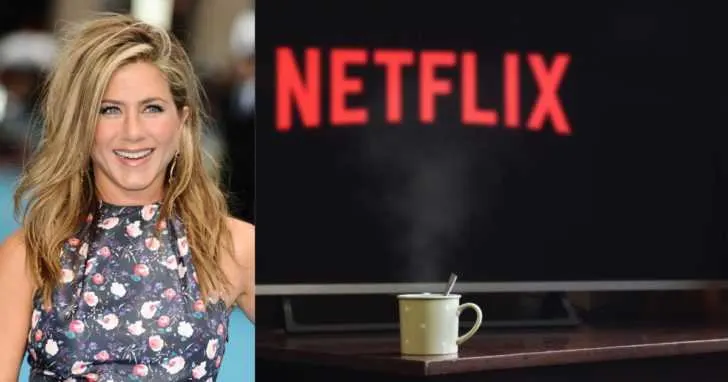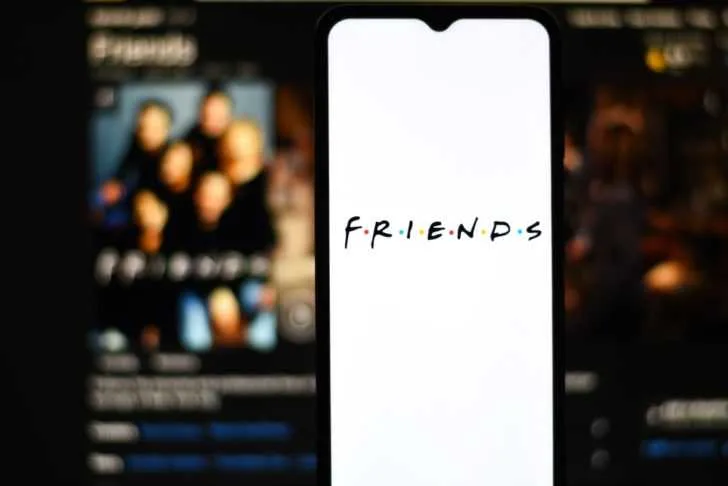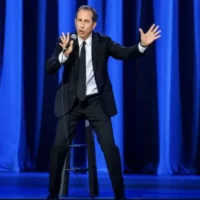Jennifer Aniston recently reignited a fiery debate by suggesting that her iconic sitcom Friends, which she starred in from 1994 to 2004, may not resonate well with today’s Gen Z audience. During its run, Friends dominated the airwaves and became a cultural behemoth, celebrated for its witty banter and memorable characters. However, as the show remains a popular choice for rewatching, some of its content now faces scrutiny through the lens of modern sensitivities. Aniston, known for her role as Rachel Green, opines that the comedic landscape has dramatically shifted, with today’s heightened sensitivity making certain jokes and storylines from the past less palatable. This conversation touches on broader themes of how society perceives humor, the evolution of societal norms, and the importance of inclusivity and sensitivity in entertainment. As “Friends” continues to engage new generations, the debate surrounding its content exemplifies the ongoing dialogue about appreciating art within its historical context while also recognizing its potential to offend. The discourse surrounding “Friends” underscores not just a nostalgic trip down memory lane but a critical examination of how timeless humor truly is. As we delve into this discussion, we explore not only the impact of “Friends” on its legion of fans but also what it reveals about the changing dynamics of comedy, culture, and societal expectations.
Jennifer Aniston on Comedy’s Changing Landscape

Jennifer Aniston, once the heartbeat of the beloved sitcom “Friends” as Rachel Green, recently shared her insights on the evolving landscape of comedy and its intersection with modern sensitivities. Her perspective sheds light on the delicate balance comedians and writers must strike in today’s world, where audience sensibilities have dramatically shifted. Aniston recognizes the seismic changes that have occurred in the comedic world since the days of “Friends.” She points out that comedy’s essence lies in its ability to poke fun at ourselves and the absurdities of life. However, she notes that the boundary for what is considered acceptable humor has shifted, reflecting a society that is now more attuned to jokes’ implications and potential to harm or alienate.
‘Friends’ Through a Contemporary Lens
The actress emphasizes that comedy now walks a fine line, navigating through heightened sensitivity and the ever-present fear of offending. Aniston suggests that while this transformation underscores a societal push towards greater empathy and understanding, it also presents challenges for creators who must now carefully consider the wider impact of their humor. This new dynamic, according to her, demands a deeper level of self-awareness and responsibility from those in the comedic sphere. Aniston candidly addresses how certain elements of “Friends” might not sit well with contemporary audiences. She acknowledges that some of the show’s jokes and storylines, which were once met with laughter and acclaim, might now be perceived as insensitive or out of touch. Whether it’s the portrayal of gender identities, relationships, or cultural diversity, Aniston understands that parts of “Friends” might be scrutinized under today’s lens of inclusivity and sensitivity.
Embracing Change While Honoring the Past
Despite recognizing these shifts, Aniston also highlights the importance of remembering the context in which “Friends” was created. She advocates for a balanced approach that allows for critical reflection on past works while also appreciating the joy and laughter they brought to so many. Aniston’s reflections invite a dialogue about how we can honor our favorite shows’ legacies while also embracing the growth and change in our societal norms and values. Jennifer Aniston’s insights into the changing landscape of comedy underscore a broader conversation about the evolution of humor, sensitivity, and inclusivity. Her perspective offers a nuanced understanding of how beloved classics like “Friends” navigate the complexities of modern audience expectations, all while reminding us of the transformative power of laughter.
The Evolution of Comedy and Societal Norms

Comedy, much like any form of art, reflects the society from which it originates. Over the decades, what audiences find humorous has evolved significantly, largely due to shifts in societal norms and sensitivities. The 1990s, in particular, marked a golden era for sitcoms, with “Friends” leading the charge. This iconic show defined a generation’s comedic taste and set a template for sitcom success that many tried to replicate.
Shifts in Audience Sensitivities
During its peak, “Friends” carved out a space for itself with its unique blend of humor, heart, and relatable characters. The show’s ability to weave comedic elements with the everyday struggles of its characters resonated deeply with its audience. It excelled in portraying the comedic side of life’s mundane moments, relationship woes, and the essence of friendship. This approach to comedy, focusing on character-driven humor and situational laughs, became a hallmark of the 90s comedy genre. However, as we move through the decades, the lens through which we view “Friends” and similar shows has shifted. Today’s audience, particularly Gen Z, comes with a heightened awareness of inclusivity, diversity, and sensitivity. Jokes that once flew under the radar are scrutinized for their implications and impact on various communities. This shift isn’t just about being politically correct; it’s about a deeper understanding and empathy towards the diverse experiences of people.
Comedy Today: A Fine Line
Today, comedians and writers navigate a fine line, balancing humor with the risk of alienating or offending their audience. The landscape has transformed from one where almost anything could be a subject of jest, to a more cautious and inclusive approach. This doesn’t mean comedy has become less funny; rather, it has grown to include a wider range of perspectives and experiences, making it more accessible and enjoyable for a broader audience. In this context, “Friends” represents an interesting case study. The show, while still beloved for its humor, charm, and warmth, also faces criticism for aspects that seem out of touch with today’s values. Its humor, at times, clashes with modern sensibilities, highlighting the journey comedy has taken from the 90s to now. This evolution speaks volumes about our collective growth in understanding and empathy, showcasing the dynamic nature of comedy as it adapts to reflect society’s changing values and norms.
Criticisms from a New Generation
As “Friends” finds its way into the hearts of a new generation, it also encounters fresh scrutiny. Modern viewers, armed with contemporary values and a keen eye for inclusivity, have pointed out several aspects of the show that seem misaligned with today’s standards. This critique spans from the portrayal of LGBTQ+ characters to the overall lack of diversity within the show’s cast and storylines. Additionally, character analysis, particularly of Ross Geller, reveals attitudes and behaviors that now raise eyebrows among viewers.
Portrayal of LGBTQ+ Characters and Lack of Diversity
One of the most discussed critiques pertains to the show’s handling of LGBTQ+ characters and themes. For instance, the character of Chandler Bing’s transgender parent is often the butt of jokes that many today find insensitive and misinformed. Similarly, the lesbian relationship between Carol and Susan was groundbreaking for its time but also subjected to a comedic lens that sometimes veered into the realm of stereotype rather than nuanced portrayal. Another significant point of contention is the show’s lack of diversity. “Friends” predominantly centers around six white protagonists navigating life in New York City, a melting pot of cultures and ethnicities. This homogeneity, especially in a setting known for its rich diversity, stands out starkly to a generation that values representation and inclusivity. The absence of significant characters from diverse backgrounds throughout the show’s ten seasons has led to criticism about its portrayal of a somewhat narrow slice of society.
The Character of Ross Geller
Ross Geller, portrayed by David Schwimmer, has come under particular scrutiny. Once beloved for his nerdy charm and romantic pursuits, Ross’s behavior towards women, his jealousy, and possessiveness are now viewed through a critical lens. His treatment of Rachel, in particular, has been dissected for signs of problematic, controlling behavior, overshadowing the more endearing aspects of his character for some viewers. These criticisms reflect a broader shift in how audiences consume media. Today’s viewers, especially those from Gen Z, bring a critical perspective to their viewing experiences, analyzing and questioning the norms and values embedded within popular culture. This shift doesn’t necessarily diminish the affection many hold for “Friends”; instead, it highlights an evolving conversation about media, representation, and the complexities of viewing past favorites through a modern lens.
What Avid Fans of ‘Friends’ Have to Say
Despite the criticisms and evolving societal norms, “Friends” continues to hold a special place in the hearts of many fans, including a portion of Gen Z viewers. These fans defend the show, highlighting the importance of viewing it within its historical context and acknowledging its significant contributions to the entertainment landscape of its time.
Impact on Comedy and Culture
Advocates for “Friends” emphasize the necessity of appreciating the show within the era it was produced. When “Friends” first aired in the 1990s, it pushed several boundaries and introduced themes that were progressive for its time. By situating the show in its rightful historical context, fans argue that it offers a snapshot of the cultural and societal norms of the 90s, serving as a cultural artifact that reflects its era’s progress and limitations. Supporters also highlight the show’s undeniable impact on comedy and popular culture. “Friends” set the benchmark for sitcom success and influenced subsequent television shows in terms of character dynamics, comedic timing, and the integration of humor with poignant moments. As fans argue, its legacy is not solely defined by its flaws but also by its strengths—its ability to connect with audiences, its inventive storytelling, and its contribution to defining a generation’s sense of humor.
The Enduring Love for “Friends”
Even among those who defend the show, flaws are often acknowledged. These viewers advocate for a balanced approach that allows for the critique of problematic elements while also celebrating the show’s virtues. They argue that it’s possible to enjoy “Friends” for its humor, warmth, and relatability while also recognizing and discussing its shortcomings in terms of diversity and sensitivity. For many, the defense of “Friends” stems from a deep-seated affection for the show and its characters. This enduring love speaks to the show’s ability to capture the universal experiences of friendship, love, and the pursuit of happiness. It underscores the notion that, while it’s important to critique and learn from the past, it’s also vital to cherish the joy and laughter that “Friends” continues to bring to its audiences, old and new.
Social Media’s Role in the Debate
Social media platforms have played a pivotal role in reigniting the debate around “Friends,” serving as a battleground for both its critique and defense. These digital forums have provided a space for nuanced discussions, allowing fans, critics, and new viewers to share their perspectives on the sitcom’s legacy and relevance. Through tweets, blog posts, and video essays, the conversation around “Friends” has flourished, showcasing a wide array of views and insights. Social media has empowered voices from all corners of the globe to weigh in on “Friends.” From in-depth analyses of the show’s treatment of gender and sexuality to lighthearted memes celebrating its funniest moments, the discourse is varied and vibrant. Platforms like X (formerly Twitter), Reddit, and YouTube have become hotspots for these discussions, enabling a dynamic exchange of ideas and opinions.
Highlighting Critical Perspectives
Critiques of the show often find a large audience on social media, where users dissect specific episodes, characters, and jokes that have not aged well. For instance, threads and videos examining Ross’s behavior or the portrayal of Chandler’s parent have sparked significant discussion and debate. These critical perspectives offer a lens through which to re-evaluate the show’s impact, encouraging a more informed and empathetic approach to consuming media from the past. Conversely, social media also acts as a platform for celebrating the enduring legacy of “Friends.” Fans share clips, quotes, and scenes that continue to resonate with them, highlighting the show’s ability to elicit laughter and joy years after its original broadcast. Through hashtags, fan pages, and virtual watch parties, enthusiasts of the show band together to reminisce and share their favorite moments, underscoring the positive impact “Friends” has had on their lives.
Bridging Generations
One of the most fascinating aspects of the social media debate is its ability to bridge generations. Older fans who watched “Friends” during its original run engage with younger viewers who are discovering it for the first time. This intergenerational dialogue enriches the conversation and offers insights into how societal changes influence the perception of media over time. Social media has ensured that the dialogue around “Friends” remains ongoing and ever-evolving. As new viewers come of age and cultural norms continue to shift, the discussions on these platforms reflect the changing attitudes towards what is considered acceptable humor and representation. This dynamic conversation not only speaks to the legacy of “Friends” but also to the broader discourse on how we engage with and critique popular culture in the digital age.
Reflecting on “Friends” and the Evolution of Comedy
The ongoing conversation surrounding “Friends” encapsulates much more than a debate over a beloved sitcom; it represents a broader dialogue about the evolution of comedy and the importance of reevaluating past entertainment through the lens of current societal values. This discourse highlights the delicate balance between appreciating the artistry and humor of bygone eras and recognizing the ways in which they might not align with today’s standards of inclusivity and sensitivity. “Friends,” with its enduring popularity, stands at the forefront of this conversation. The show, which defined a generation’s comedic tastes, continues to resonate with audiences worldwide, even as it faces scrutiny from newer viewers. This scrutiny has sparked meaningful discussions on the role of humor in society, the impact of representation in media, and how cultural norms shift over time. Despite the criticisms, “Friends” remains a cultural juggernaut, cherished for its heart, humor, and the way it captures the essence of human connection. “Friends” does more than entertain; it prompts us to reflect on the changing dynamics of comedy, the power of storytelling, and our collective growth in understanding and tolerance. As we continue to enjoy classic shows and movies, let us also engage in the critical, thoughtful, and compassionate evaluation they deserve, enriching our appreciation of art and its impact on society.



